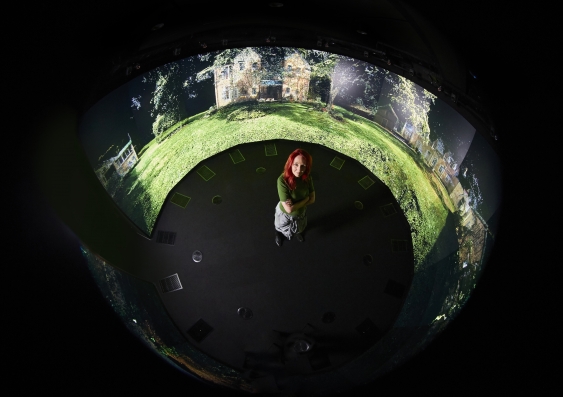A fresh lens on anxiety
Australia’s first high-tech festival to explore the experience of anxiety will fuse art, science and technology to shake up approaches to mental health.
Australia’s first high-tech festival to explore the experience of anxiety will fuse art, science and technology to shake up approaches to mental health.

Sometimes described as the ‘modern plague’, anxiety affects more than two million Australians each year. Now an innovative Sydney-wide festival is set to reframe conversations around the all-too-common condition.
A unique collaboration led by UNSW, the Black Dog Institute, and numerous partners in the cultural sector, The Big Anxiety: Festival of Arts + Science + People is an event of unprecedented scale in the field of mental health research, supported by a major grant from the federal government’s Catalyst—Australian Arts and Culture Fund.
Spanning more than 60 events over seven weeks and numerous cultural hubs in greater Sydney, the festival will include state-of-the-art immersive environments, international art exhibitions, theatre and performance, interactive media events and public forums designed by some of the world’s most progressive creative innovators.
Festival director, Professor Jill Bennett from UNSW Art & Design, says the event will showcase the combined strengths of art, science and technology and the ways they can make a difference to people’s lives.
“Around 65% of Australians with mental health issues don’t seek or access help. Our aim is to develop the rich communications and engagement strategies we need to connect with people experiencing mental health issues,” she says.
Bennett was recently awarded a prestigious Australian Laureate Fellowship by the Australian Research Council to pioneer the use of immersive visualisation technology in the understanding of stigmatised conditions, particularly mental decline in the ageing population.
“We are opening up a new area of visualisation, using immersive media to create the possibility of seeing through the eyes of another,” she says.
Located at multiple venues across greater Sydney, including UNSW, Customs House, the MCA, the Art Gallery of NSW and Parramatta’s Riverside Theatre, the festival will help visitors understand the lived experience of anxiety through state-of-the-art technology including UNSW Art & Design’s Expanded Perception and Interaction Centre (EPICentre).
At EPICentre, festival visitors can experience the 3D, 360-degree multimedia project A Woman’s Place, an exploration of the traumatic memories of former Parramatta Girls’ Home residents. In the nearby National Facility for Human Robot Interaction, visitors can play a game that tests their stress responses in a responsive environment, created by UNSW’s Creative Robotics Lab, the Black Dog Institute and Supermanoeuvre architects.
“The Big Anxiety Festival promises to connect with diverse audiences in ways that direct mental health messaging can’t do,” says festival supporter and NSW Mental Health Commissioner John Feneley.
The festival’s mental health lead Professor Katherine Boydell, from the Black Dog Institute, agrees. She says art and technology have the power to promote empathy and decrease stigma around mental health issues.
“Art provides a great entry point for communication about mental health – when people experience something and it is visual, conversations are generated and people find multiple ways of engaging with each other,” Boydell says.
“The festival will visually capture the pervasiveness of anxiety and provide multiple places for people to connect and communicate about it.”
“Art provides a great entry point for communication about mental health.”
The NeurodiverseCity exhibition at Customs House aims to start a conversation about urban design, by exhibiting the work of autistic artists such as UNSW PhD graduate, Dawn-joy Leong, that improve the sensorial experience of our cities.
Travelling straight to the public is the festival’s Mobile Mood Lab. The repurposed ambulance features interactive artworks by UNSW’s Dr George Khut, whose compelling visualisations are created from wearable sensor technologies. Visitors to the Mood Lab will receive visual feedback on their stress and anxiety levels as their heart rate, skin temperature and brainwaves literally transform into works of art.
Far from focusing on the negative aspects of anxiety, Bennett explains the festival will celebrate stories of individual and community resilience.
The World’s Largest Mental Health Lesson at Sydney Town Hall will teach high- school students about resilience and how to manage anxiety and depression. Led by Professor of Clinical Psychology and Rehabilitation at King’s College London, Dame Til Wykes, the event is a bid to break the Guinness World Record for the biggest lesson in mental health.
UNSW Vice-Chancellor Professor Ian Jacobs says the festival embraces social engagement – a critical element of the University’s 2025 Strategy.
“We know that every year, around 4% of Australians will experience a major depressive episode and 14% will experience an anxiety disorder. I can think of no better use of UNSW technology research and innovation than developing new and imaginative ways to communicate the experiences of mental illness, recovery and resilience.”
The Big Anxiety Festival sponsors include the Australian Government, City of Sydney, Bridging Hope Charity Foundation, Neilson Foundation and the Mental Health Commission of NSW.
The Big Anxiety Festival runs from 20 September to 11 November.